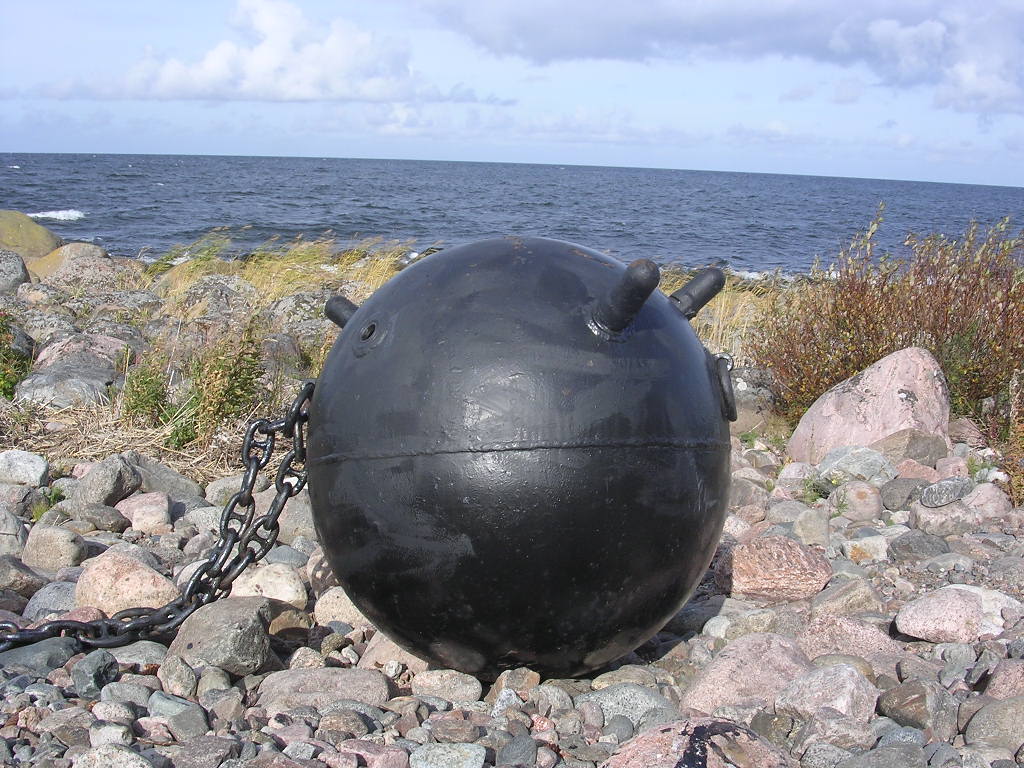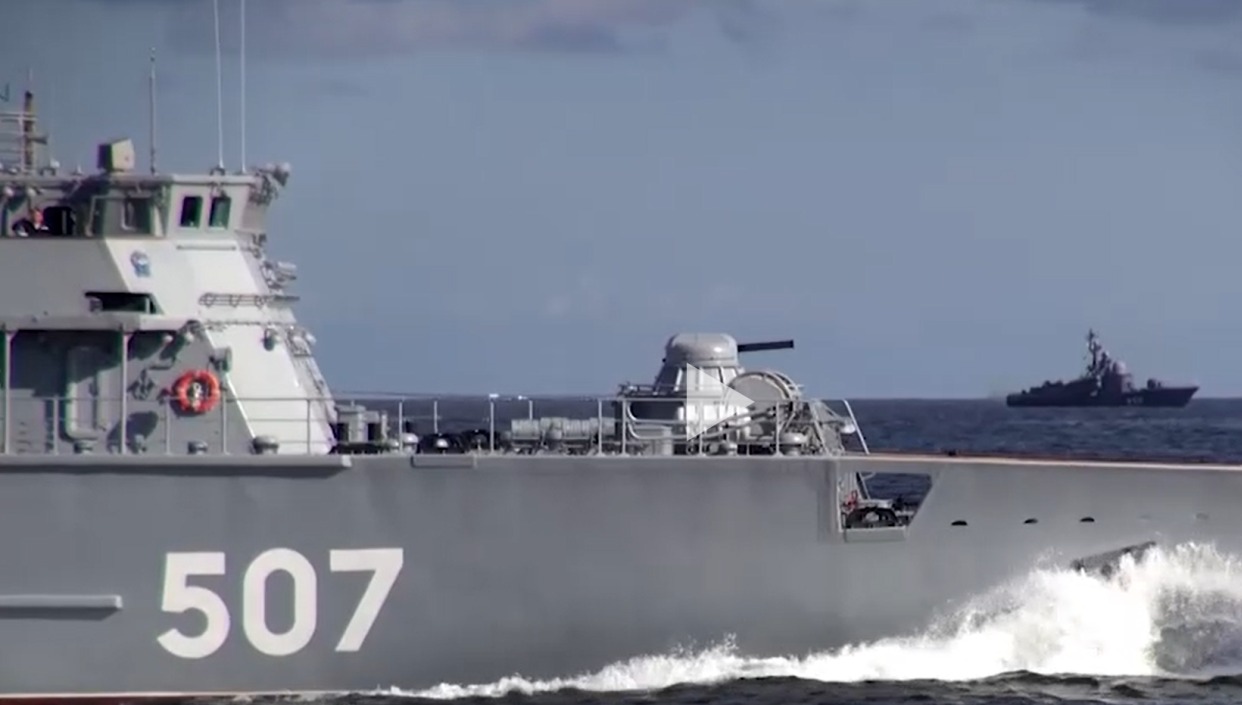As the Black Sea remains infested with mines that pose a massive risk to Russian vessels, the Russian Black Sea Fleet (BSF) has come up with an advanced solution: using unmanned underwater vehicles (UUVs) for clearing sea mines.
The crew of a Russian BSF mine defense ship recently employed an unnamed UUV to search mines, Russian news service Izvestia claimed. Subsequently, the Information Support Department of the Black Sea Fleet also published footage of this operation on January 24.
The service announced that the Black Sea’s trawling forces conducted a reconnaissance search for mines along the routes of active merchant shipping in the Black Sea due to the mine danger posed by the Ukrainian side’s mining activities along some of the coast and sea areas.
Although the Izvestia report did not name the vessels involved in the operation, social media reports noted that the crew of the Aleksandrit-class minesweeper “Alexandr Obukhov” devised a method for using sonar and a remote-controlled unmanned underwater vehicle to hunt for submerged objects in a single mine countermeasures circuit.
Using state-of-the-art hydroacoustic stations and a contemporary remote-controlled unmanned underwater vehicle, the anti-mining ship’s crew created a reconnaissance search protocol for a single mine action circuit.
The crew of the Aleksandrit-class minesweeper "Alexandr Obukhov" worked out the procedure for searching for underwater objects in a single mine countermeasures circuit using sonar and a remote-controlled unmanned underwater vehicle.
📹 MoD RF pic.twitter.com/XOEEaJ45KK— Massimo Frantarelli (@MrFrantarelli) January 24, 2024
In the first stage, the underwater object was discovered by the personnel of the combat post of the ship’s hydroacoustic station. The crew used an unmanned undersea vehicle deployed autonomously to discover an anchor mine.
The mine was then destroyed when it rose above the water’s surface after being freed from the anchor using a cable cutter. The ship’s crew also manually practiced a preventive grenade launcher along with the DP-64 anti-sabotage grenade launcher to prepare for potential underwater saboteur threats.
The Russian BSF stopped short of naming the drone that was used in this mine-clearing operation. However, the country has developed, tested, and inducted several UUVs in recent years for various roles.
There are hundreds of mines in the Black Sea that have been dropped by both sides in the ongoing Ukraine war, endangering civilian ships and people. Both Russia and Ukraine continue to blame each other for planting sea mines in the Black Sea.

Currently, the scope of the mining operations is unknown, but it is believed that they are enough to deal a severe blow to a vessel that comes in contact with them.
Unlike landmines, sea mines are not prohibited by international agreements. Nonetheless, specific guidelines are mandated by international humanitarian law. States may deploy them, for instance, in their territorial waters to protect their coasts from outside threats.
Ukraine formally acknowledged having “installed naval mines” in June 2022 as it announced: ”In the exercise of our right to self-defense as stipulated under article 51 of the UN charter.”
Russia is not the only one trying to clear the Black Sea of sea mines. Since it has no naval force of its own, Ukraine has outsourced efforts to clear Russian mines and secure the sea for the seamless movement of cargo ships that already remain at risk after Russia pulled out of the grain initiative last year.
Ukraine’s Mine Clearing In Black Sea Picks Up Speed!
Since Russia’s invasion in February 2022, sea mines have threatened Ukraine’s export routes across the Black Sea. Several commercial ships have been struck, including a bulk carrier traveling to the River Danube port in December to load grain.
In late December, Ukraine’s border guards announced that an unidentified Panama-flagged ship struck a mine while sailing towards its Danube ports, losing control and speed and starting a fire on the upper deck. At least two crew members aboard the vessel were also injured.
Although Ukraine does not have battleships, commercial cargo ships are essential for grain export. The need to clear the sea of any mines laid by Russia has, thus, intensified. Moreover, a sea mine could be tethered to a steel cable to remain underwater, or it may be made to explode when it comes into contact with a vessel’s hull. But in storms, they can come loose, and in sea currents, they can float a great distance.
So, the sea mine is not just Ukraine’s headache anymore. Other littoral Black Sea nations, including NATO members, are also at risk from these sea mines.
AFU Command South — In the Black Sea, a civilian vessel under the flag of Panama was damaged by an enemy sea mine.
The bulker was on its way to one of the Danube ports to be loaded with grain.
The ship lost speed and control, a fire broke out on the upper deck. To avoid… pic.twitter.com/fOOCdj4ika
— OSINT (Uri) 🇺🇸 🇨🇦 🇬🇧 🇺🇦 🇮🇱 (@UKikaski) December 28, 2023
After making a case for mine clearing operations for a long time, it succeeded as it got three other Black Sea countries to forge an agreement.
Following months of negotiations between the NATO allies Turkey, Romania, and Bulgaria, they signed an agreement earlier this month on a cooperative plan to clear mines floating in the Black Sea as a result of the conflict in Ukraine.
A trilateral initiative to clear the explosives was formed in Istanbul by signing a memorandum of cooperation by Bulgaria’s Deputy Defense Minister Atanas Zapryanov, Romanian counterpart Angel Tilvar, and Turkish Defense Minister Yasar Guler.
“With the start of the war, a threat of floating mines in the Black Sea has arisen. To combat it … we agreed to form a Black Sea mine counter-measures task group,” Guler said at the signing ceremony.
"Аgreement signed by Romania, Bulgaria, and Turkey for humanitarian demining.
Together, they will create a group to oversee joint demining operations in their territorial waters in the Black Sea, since Russian mines are now a problem for all coastal states of the Black Sea." https://t.co/hZ2xkKMuz7— CIA FOLLOWED (@OPEN_MINDED_ME) January 17, 2024
According to a Turkish defense ministry official, the effort will involve assigning three minehunting ships and one command control ship from each nation. Additionally, Guler stated that after the conflict in Ukraine is over, other Black Sea states might be included in the committee that will be led by the naval chiefs of the three nations.

Although Guler stated that only ships from the “three littoral allied countries” would be allowed to participate, Turkey saw possible contributions to this endeavor from non-Black Sea NATO members as “valuable.”
In a post on social media site X, NATO spokeswoman Dylan White hailed the agreement, calling it “an important contribution toward greater freedom of navigation and food security in the region and beyond.”
As they sought to finalize the effort, defense ministers from the three Black Sea nations discussed the mine-clearing plan during NATO meetings in Brussels in October last year and Ankara in November.
Although there have been no visible developments in the negotiations, Ankara, which has cordial relations with both Kyiv and Moscow, is also collaborating with the UN, Ukraine, and Russia to resurrect the Black Sea grain plan, which Moscow abandoned last year.
- Contact the author at sakshi.tiwari9555(at)gmail.com
- Follow EurAsian Times on Google News




